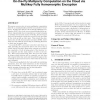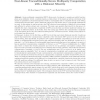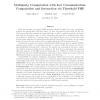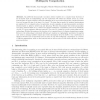148
click to vote
STOC
2012
ACM
13 years 4 months ago
2012
ACM
We propose a new notion of secure multiparty computation aided by a computationally-powerful but untrusted “cloud” server. In this notion that we call on-the-fly multiparty c...
137
click to vote
CRYPTO
2012
Springer
13 years 4 months ago
2012
Springer
Abstract. We present the first black-box construction of a secure multiparty computation protocol that satisfies a meaningful notion of concurrent security in the plain model (wi...
146
click to vote
IACR
2011
14 years 1 months ago
2011
Secure multiparty computation (MPC) allows a set of n players to compute any public function, given as an arithmetic circuit, on private inputs, so that privacy of the inputs as we...
154
click to vote
IACR
2011
14 years 1 months ago
2011
Fully homomorphic encryption (FHE) provides a simple template for secure computation between two parties (Alice and Bob) where: (I) Alice encrypts her input under her key, (II) Bo...
124
click to vote
EUROCRYPT
2011
Springer
14 years 5 months ago
2011
Springer
An additively-homomorphic encryption scheme enables us to compute linear functions of an encrypted input by manipulating only the ciphertexts. We define the relaxed notion of a se...
121
click to vote
SCN
2010
Springer
15 years 13 days ago
2010
Springer
We consider a collection of related multiparty computation protocols that provide core operations for secure integer and fixed-point computation. The higher-level protocols offer...
120
click to vote
JOC
2000
15 years 1 months ago
2000
The goal of secure multiparty computation is to transform a given protocol involving a trusted party into a protocol without need for the trusted party, by simulating the party am...
119
click to vote
CORR
2007
Springer
15 years 2 months ago
2007
Springer
It is well known that, in theory, the general secure multiparty computation problem is solvable using circuit evaluation protocols. However, the communication complexity of the re...
130
click to vote
GRC
2008
IEEE
15 years 3 months ago
2008
IEEE
—Secure multiparty computation is a very important research topic in cryptography. A secure multi-party computation involves N untrusful parties. It takes input xi from the ith p...
109
click to vote
CTRSA
2008
Springer
15 years 3 months ago
2008
Springer
We motivate and describe the problem of finding protocols for multiparty computations that only use a single broadcast round per computation (latency-free computations). We show t...




